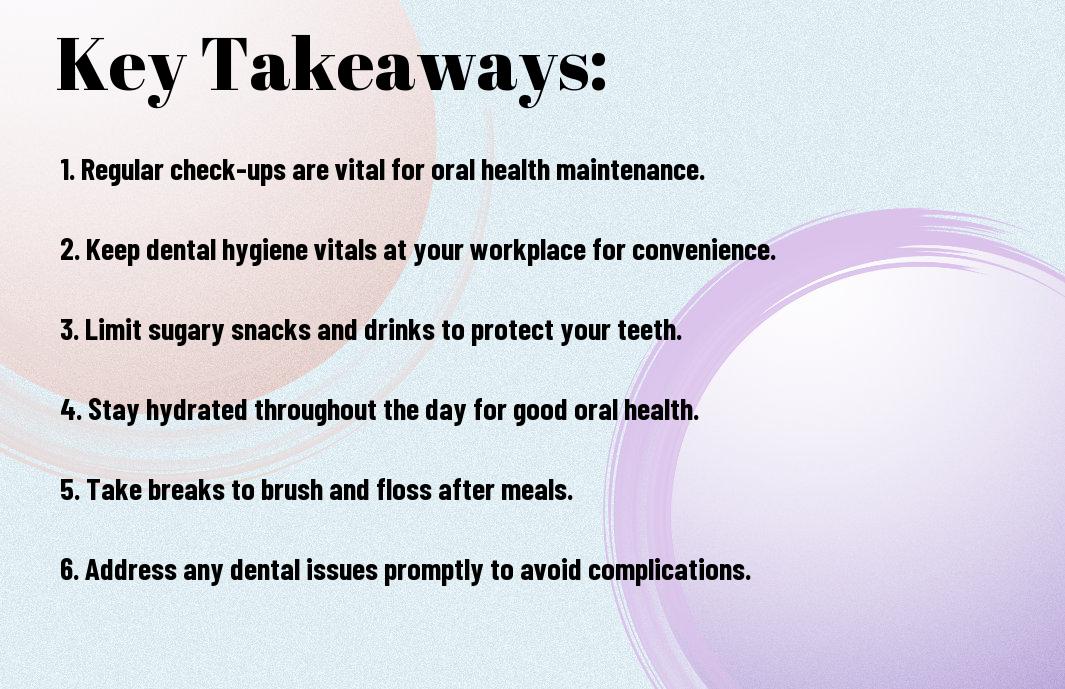It’s imperative for professionals with hectic schedules to prioritize their dental health in the workplace. Neglecting oral care can have long-term consequences on overall health and productivity. To help busy individuals maintain a healthy smile, we have compiled crucial tips and strategies. For more detailed oral care recommendations for busy people, check out this Oral Care Guide for Busy People.
Understanding Dental Health
While maintaining good dental health is crucial for everyone, it is especially important for professionals with busy schedules. Neglecting oral hygiene can lead to various dental issues that can impact your overall wellbeing and productivity.
Common Dental Issues Among Professionals
On a tight schedule, professionals often tend to skimp on oral care routines, leading to common dental issues such as cavities, gum disease, and bad breath. Stress and poor dietary choices can exacerbate these problems, further compromising dental health.
On top of that, irregular dental check-ups and cleanings can result in undetected issues that may escalate into more serious conditions, causing discomfort and potential disruptions to work schedules.
The Connection Between Oral Health and Overall Wellbeing
Health professionals emphasize the significant connection between oral health and overall wellbeing. Poor oral health has been linked to various systemic diseases such as heart disease, diabetes, and respiratory infections. It is vital to understand that neglecting oral hygiene can have far-reaching consequences beyond just toothaches and cavities.
For instance, gum disease has been associated with an increased risk of cardiovascular problems due to the inflammation and bacteria entering the bloodstream. By prioritizing dental health, professionals can not only maintain a bright smile but also safeguard their overall health and quality of life.
Strategies for Dental Care at Work
Scheduling and Prioritizing Dental Appointments
Work schedules can be demanding, making it tough to find time for dental appointments. However, it is crucial to prioritize your dental health. One way to fit in dental appointments is to schedule them during off-peak work hours, such as early mornings or late afternoons. Blocking off time in your calendar well in advance can help you plan around work commitments.
Another strategy is to consolidate dental appointments to minimize the impact on your work schedule. Consider scheduling multiple treatments in a single visit to reduce the number of times you need to take off work. Communicating your scheduling needs with your dental office can also help them accommodate your busy schedule.
Quick Dental Hygiene Practices for the Office
Quick and simple dental hygiene practices can be incorporated into your workday to maintain oral health. Keep a toothbrush and toothpaste at your desk to brush after meals. If brushing is not feasible, rinsing your mouth with water or mouthwash can help remove food particles and bacteria. Floss picks are convenient for removing debris between teeth and can easily be used discreetly at your desk.
Regular water consumption throughout the day can also promote dental health by washing away sugars and acids that can lead to tooth decay. Chewing sugar-free gum with xylitol can stimulate saliva production, which helps neutralize acids in the mouth and prevent cavities.
For instance, placing a reminder on your work computer or setting an alarm on your phone can help you stay consistent with these quick dental hygiene practices. Recall, even small efforts made throughout the workday can contribute to better oral health in the long run.
Nutrition and Lifestyle Choices for Dental Health
To maintain optimal dental health, professionals with busy schedules should pay close attention to their nutrition and lifestyle choices. Incorporating foods that promote oral health and avoiding habits that can lead to dental issues are imperative for a healthy smile.
Foods That Promote Oral Health
An imperative aspect of maintaining good dental health is consuming foods that promote oral health. Foods rich in calcium, such as milk, cheese, and yogurt, help strengthen teeth. Crunchy fruits and vegetables like apples and carrots can help clean teeth naturally and stimulate saliva production, which is crucial for maintaining a healthy mouth environment.
Habits to Avoid for Better Dental Outcomes
Dental professionals should be mindful of habits that can have a negative impact on their oral health. Avoiding excessive consumption of sugary and acidic foods and beverages is crucial as they can contribute to tooth decay and enamel erosion. Additionally, smoking and using tobacco products not only stain teeth but also increase the risk of gum disease and oral cancer.
Better dental outcomes can be achieved by steering clear of detrimental habits such as nail-biting, teeth grinding, and using teeth as tools for opening packages. These habits can weaken teeth, lead to jaw problems, and cause unnecessary wear and tear on the enamel, ultimately compromising overall dental health.
Tools and Resources
Not prioritizing your dental health in the workplace can lead to numerous issues down the line. It is crucial for professionals with busy schedules to have the right tools and resources at their disposal to maintain optimal oral hygiene even while on the job.
Essential Dental Health Products for the Desk Drawer
For professionals on the go, keeping necessary dental health products in your desk drawer can make a significant difference. Items such as a travel-sized toothbrush, toothpaste, floss, and mouthwash can help you freshen up after meals and maintain good oral hygiene throughout the day.
Having these products readily available can encourage you to incorporate oral care into your daily routine at work, ensuring that you are taking the necessary steps to prevent dental issues in the long run.
Mobile Apps and Reminders for Dental Health Management
With the rise of technology, there are now mobile apps available that can help professionals manage their dental health effectively. These apps can provide reminders for brushing and flossing, track your oral hygiene habits, and even offer tips for improving your dental care routine.
The convenience of having these tools on your smartphone can help you stay on top of your oral health despite a hectic schedule, ultimately leading to better dental outcomes in the future.
The use of mobile apps and reminders for dental health management is a great way to leverage technology in promoting good oral hygiene practices. By utilizing these resources, professionals can take proactive steps towards maintaining a healthy smile amidst their busy work lives.
Establishing a Supportive Workplace
Your workplace plays a crucial role in promoting dental health among employees. By fostering a supportive environment and implementing policies that prioritize oral health, you can help your team maintain good dental hygiene habits despite their busy schedules.
Creating a Dental Health Friendly Office Environment
Workplace environment can have a significant impact on employees’ dental health. Encourage good practices such as providing healthy snacks, water stations, and creating designated areas for brushing and flossing. Additionally, ensure that your office is well-stocked with dental supplies like toothbrushes, toothpaste, and floss to promote regular oral hygiene habits among your team.
Encouraging Employee Dental Care Through Policy and Benefits
Establishing clear policies that support dental health can make a difference in your employees’ overall well-being. Consider offering dental insurance as part of your benefits package and encourage regular dental check-ups by allowing flexible scheduling or paid time off for dental appointments. By prioritizing oral health in your company policies, you show your commitment to the well-being of your employees.
Plus, implementing initiatives such as educational seminars on oral health, offering discounts on dental services, or organizing group activities focused on dental health can further incentivize your team to prioritize their dental care. By incorporating dental health into your workplace culture, you create a supportive environment that promotes overall wellness and productivity.
Final Words
So, by implementing these simple yet effective tips for dental health in the workplace, professionals with busy schedules can prioritize their oral care and prevent potential dental issues. Consistent habits such as packing healthy snacks, staying hydrated, practicing good oral hygiene, and scheduling regular dental check-ups can make a significant difference in maintaining a healthy smile while balancing a busy work life. Keep in mind, good dental health not only contributes to overall well-being but also boosts confidence and professional success. By making small adjustments to your daily routine, you can ensure that your smile remains radiant and your oral health stays in top condition, even with a hectic work schedule.







